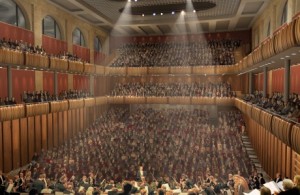The £45m transformation of Bristol’s Colston Hall concert venue is a step closer after Arts Council England said it could make £10m available for the project.
Bristol Music Trust, which runs Colston Hall, will immediately receive more than £400,000 from the Arts Council to further develop the design and details of the transformation.
If successful, the remainder of the £10m investment would be awarded. It would be the largest single capital award yet made in the South West. 
A third of the money for Colston Hall’s Thank You for the Music appeal – launched in September 2014 – has already been raised following commitments from the Government (£5m) and Bristol City Council (£10m). The Arts Council England investment would bring the total committed up to £25m.
Under the ambitious plans the venue’s two existing concert halls would be revitalised to improve acoustics and comfort for audiences while a third hall would also open. Work would started in 2017 – the hall’s 150th anniversary year – and finish two years later,
Also included would be state-of-the-art education facilities to inspire 130 local schools and 20,000 children to fulfil their musical potential. The impact on the local economy is estimated at £100m over the first five years, in part due to higher audience figures.
Once Bristol Music Trust has developed its design work it will go through a further round of assessment by the Arts Council.
Trust chief executive Louise Mitchell said: “This announcement is the best start to 2016 that our transformation campaign could wish for. It’s a huge vote of confidence from Arts Council England in our plans to redevelop Colston Hall and make sure we take our place as one of the best arts and learning facilities in the country.
“The transformation will touch tens of thousands of lives. Our audiences and the children that we educate will benefit immensely from the new facilities. We’ll also boost the Bristol economy by tens of millions of pounds each year.
“I’d like to thank everyone who has contributed to the project so far, particularly Bristol City Council and architects Levitt Bernstein who, following on from the very successful foyer development in 2009 have been working tirelessly on the project ever since.”
The transformation is also capturing the imagination of the public. In just a few months the 45k for 45m campaign has gained support from nearly 10,000 people.
Phil Castang, head of Bristol Plays Music – the city’s music education hub that is run by Bristol Music Trust – said, “It’s excellent that Arts Council England recognises the value that we put on education at Colston Hall and how we are determined to improve our outdated facilities.
“Every day, we inspire children to develop their musical talent. But a revitalised concert hall and modern education suites will provide us with an even more inspiring place to educate all.”
Mayor George Ferguson added: “Bristol has a great partnership with the Arts Council and I am particularly grateful that they have agreed to match our £10m commitment. The transformation of the Colston Hall will give a great boost to the rich arts and cultural mix in Bristol – creating a performance and education venue worthy of the 21st century as well as boosting the local economy. I would like to give special thanks to assistant mayor Simon Cook who has done so much to broker this offer and will continue to work closely with me and the Trust in helping to bridge the funding gap.”
Arts Council England South West director Phil Gibby said welcomed funding decision.
“We have been in positive discussions with Bristol Music Trust, Bristol City Council and other partners as the plans for Colston Hall have developed because we recognise nationally that this is an important cultural resource that will truly be world class once this final stage of the refurbishment is complete,” he said.
The transformation plans include opening up Colston Hall’s cellars for the first time in 100 years for educational and workshop space and restoring the frontage to its Victorian magnificence.
Colston Hall is the country’s only major concert hall not to have undergone a major redevelopment since the 1980s.






























